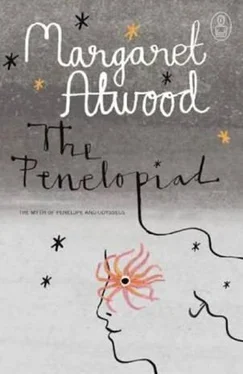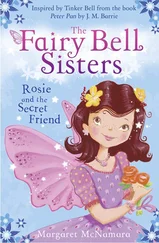But I’ve always been of a determined nature. Patient, they used to call me. I like to see a thing through to the end.
II. The Chorus Line: Rope-Jumping Rhyme
we are the maids the ones you killed the ones you failed
we danced in air our bare feet twitched it was not fair
with every goddess, from there to here you scratched your itch
we did much less than what you did you judged us bad
you had the spear you had the word at your command
we scrubbed the blood of our dead paramours from floors,
from stairs, from doors, we knelt in water while you stared
at our bare feet it was not fair you licked our fear
it gave you pleasure you raised your hand you watched us fall
we danced on air the ones you failed the ones you killed
Where shall I begin? There are only two choices: at the beginning or not at the beginning. The real beginning would be the beginning of the world, after which one thing has led to another; but since there are differences of opinion about that, I’ll begin with my own birth.
My father was King Icarius of Sparta. My mother was a Naiad. Daughters of Naiads were a dime a dozen in those days; the place was crawling with them. Nevertheless, it never hurts to be of semi divine birth. Or it never hurts immediately.
When I was quite young my father ordered me to be thrown into the sea. I never knew exactly why, during my lifetime, but now I suspect he’d been told by an oracle that I would weave his shroud.
Possibly he thought that if he killed me first, his shroud would never be woven and he would live forever. I can see how the reasoning might have gone. In that case, his wish to drown me came from an understandable desire to protect himself. But he must have misheard, or else the oracle herself misheard—the gods often mumble—because it was not his shroud that was at issue, but my father-in law’s shroud. If that was the prophecy it was a true one, and indeed the weaving of this particular shroud proved a great convenience to me later on in my life.
The teaching of crafts to girls has fallen out of fashion now, I understand, but luckily it had not in my day. It’s always an advantage to have something to do with your hands. That way, if someone makes an inappropriate remark, you can pretend you haven’t heard it. Then you don’t have to answer.
But perhaps this shroud-weaving oracle idea of mine is baseless. Perhaps I have only invented it in order to make myself feel better. So much whispering goes on, in the dark caverns, in the meadows, that sometimes it’s hard to know whether the whispering is coming from others or from the inside of your own head. I use head figuratively. We have dispensed with heads as such, down here.
No matter—into the sea I was thrown. Do I remember the waves closing over me, do I remember the breath leaving my lungs and the sound of bells people say the drowning hear? Not in the least. But I was told the story: there is always some servant or slave or old nurse or busybody ready to regale a child with the awful things done to it by its parents when it was too young to remember. Hearing this discouraging anecdote did not improve my relations with my father. It is to this episode—or rather, to my knowledge of it—that I attribute my reserve, as well as my mistrust of other people’s intentions.
It was stupid of Icarius to try to drown the daughter of a Naiad, however. Water is our element, it is our birthright. Although we are not such good swimmers as our mothers, we do have a way of floating, and we’re well connected among the fish and seabirds. A flock of purple-striped ducks came to my rescue and towed me ashore. After an omen like that, what could my father do? He took me back, and renamed me—Duck was my new nickname. No doubt he felt guilty about what he’d almost done: he became, if anything, rather too affectionate towards me.
I found this affection difficult to reciprocate. You can imagine. There I would be, strolling hand in hand with my apparently fond male parent along a cliff edge or a river bank or a parapet, and the thought would occur to me that he might suddenly decide to shove me over or bash me to death with a rock. Preserving a calm facade under these circumstances was a challenge. After such excursions I would retire to my room and dissolve in floods of tears. (Excessive weeping, I might as well tell you now, is a handicap of the Naiad-born. I spent at least a quarter of my earthly life crying my eyes out. Fortunately in my time there were veils. They were a practical help for disguising red, puffy eyes.)
My mother, like all Naiads, was beautiful, but chilly at heart. She had waving hair and dimples, and rippling laughter. She was elusive. When I was little I often tried to throw my arms around her, but she had a habit of sliding away. I like to think that she may have been responsible for calling up that flock of ducks, but probably she wasn’t: she preferred swimming in the river to the care of small children, and I often slipped her mind. If my father hadn’t had me thrown int—o the sea she might have dropped me in herself, in a fit of absent-mindedness or irritation. She had a short attention span and rapidly changing emotions.
You can see by what I’ve told you that I was a child who learned early the virtues—if such they are—of self-sufficiency. I could see that I would have to look out for myself in the world. I could hardly count on family support.
IV. The Chorus Line: Kiddie Mourn, A Lament by the Maids
We too were children. We too were born to the wrong parents. Poor parents, slave parents, peasant parents, and serf parents; parents who sold us, parents from whom we were stolen. These parents were not gods, they were not demi-gods, they were not nymphs or Naiads. We were set to work in the palace, as children; we drudged from dawn to dusk, as children. If we wept, no one dried our tears. If we slept, we were kicked awake. We were told we were motherless. We were told we were fatherless. We were told we were lazy. We were told we were dirty. We were dirty. Dirt was our concern, dirt was our business, dirt was our specialty, dirt was our fault. We were the dirty girls.
If our owners or the sons of our owners or a visiting nobleman or the sons of a visiting nobleman wanted to sleep with us, we could not refuse. It did us no good to weep, it did us no good to say we were in pain. All this happened to us when we were children. If we were pretty children our lives were worse. We ground the flour for lavish wedding feasts, then we ate the leftovers; we would never have a wedding feast of our own, no rich gifts would be exchanged for us; our bodies had little value. But we wanted to sing and dance too, we wanted to be happy too. As we grew older we became polished and evasive, we mastered the secret sneer. We swayed our hips, we lurked, we winked, we signalled with our eyebrows, even when we were children; we met boys behind the pigpens, noble boys and ignoble boys alike. We rolled around in the straw, in the mud, in the dung, on the beds of soft fleece we were making up for our masters.
We drank the wine left in the wine cups. We spat onto the serving platters. Between the bright hall and the dark scullery we crammed filched meat into our mouths. We laughed together in our attics, in our nights. We snatched what we could.
It’s dark here, as many have remarked. ‘Dark Death’ they used to say. ‘The gloomy halls of Hades’, and so forth. Well, yes, it is dark, but there are advantages—for instance, if you see someone you’d rather not speak to you can always pretend you haven’t recognised them.
There are of course the fields of asphodel. Yoo can walk around in them if you want. It’s brighter there, and a certain amount of vapid dancing goes on, though the region sounds better than it is. The fields of asphodel has a poetic lilt to it. But just consider. Asphodel, asphodel, asphodel. Pretty enough white flowers, but a person gets tired them after a while. It would have been better to supply some variety—an assortment of colours, a few winding paths and vistas and stone benches and fountains. I would have preferred a few hyacinths at least, and would a sprinkling of crocuses have been too much to expect? Though we never get spring here, or any other seasons. You do have to wonder who designed the place.
Читать дальше












